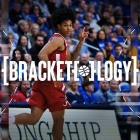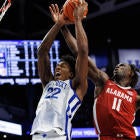Memphis' complicated, potentially rule-breaking recruitment of star James Wiseman has become the first case that will be judged by the NCAA's new independent investigation arm, the Independent Accountability Resolution Process. The process, established last summer in the wake of the FBI's investigation of college basketball scandal, gives independent investigators and law experts outside the NCAA broad powers to investigate wrongdoing.
Perhaps most ominous for Memphis is that there is no appeal to whatever penalties may be applied as part of the judgement handed down.
While the NCAA did not specify the details of the Memphis case, it most likely has to do with Wiseman. The former No. 1 recruit in the Class of 2019 was ruled ineligible in November 2019 based on alleged inducements his family received during the recruiting process.
Memphis was originally told Wiseman would likely be ineligible to play after current Tigers coach Penny Hardaway allegedly paid Wiseman's family $11,500 in moving expenses while the player was still in high school. That was deemed an extra benefit.
Instead of Memphis benching Wiseman as a precaution, it obtained a restraining order to keep him on the court. Wiseman appeared in three games prior to the NCAA suspending him for 12 games. He then declared for the NBA Draft in December.
The IARP was established in August 2019 after being recommended by the Rice Commission on College Basketball in the wake of that FBI investigation scandal that dated back to September 2017.
There has been much consternation in major-college athletics as to which school would be the first investigated by the new process. It was the uncertainty of the outcome from a new process that concerned athletic directors.
The Fort Worth Star-Telegram reported in October 2019 that Baylor might be the first school to go through the process. Baylor is currently involved in a major violations case regarding extra benefits dating back to former football coach Art Briles and the Bears' sexual assault scandals. The Baylor case was not referred.
The Independent Resolution Panel that will hear the Memphis case was assembled to hear only the most high-profile cases. That 15-person panel is made up of law experts, academics and at least one retired judge, Patricia Timmons Goodson formerly of the North Carolina Supreme Court. NCAA president Mark Emmert initially suggested only a handful of cases per year would be heard by the panel.
Among those unprecedented investigate powers, according to the Complex Case Unit procedures, are "observation of public places (on or off campus)" in order to gather information. The unit is the investigative arm of the IARP. Its procedures can be found here.
Last year, CBS Sports pointed out an apparent conflict of interest regarding that Complex Case Unit.
Five of the 16 persons on the unit are employed by Freeh Group International Solutions. That same firm was criticized for conflict of interest after soliciting NCAA business at the same time it was conducting what was supposed to be an independent review of Penn State in the Jerry Sandusky scandal.
Also of issue is that former, current or recruited athletes -- as well as school staff -- can be given limited immunity in order to obtain information. That Complex Case Unit is made up of at least one "independent external investigator."
None of those members have affiliation to a school. Famed Arkansas-based attorney Tom Mars is an "advocate" on the unit. He has famously battled the NCAA on transfer eligibility cases in the past. Now, his expertise is being used by the NCAA.
Critics of the infractions process often cited the need for third-party influence in adjudicating cases. There has always been a certain unease with NCAA member schools judging their peers in the traditional infractions process.
The IARP was developed to "minimize perceived conflicts of interest," according to the NCAA. The NCAA has never explained why there are no appeals allowed as part of the new process. The traditional infractions process includes redress with the Infractions Appeals Committee.
The Memphis case was referred to the IARP by the Infractions Referral Committee. That group includes MAC commissioner Jon Steinbrecher, Belmont University dean Alberto Gonzalez, University of Pennsylvania athletic director (and NCAA Council chair) Grace Calhoun and Independent Resolution Panel Jeffrey Benz.
![[object Object] Logo](https://sportshub.cbsistatic.com/i/2020/04/22/e9ceb731-8b3f-4c60-98fe-090ab66a2997/screen-shot-2020-04-22-at-11-04-56-am.png)


















